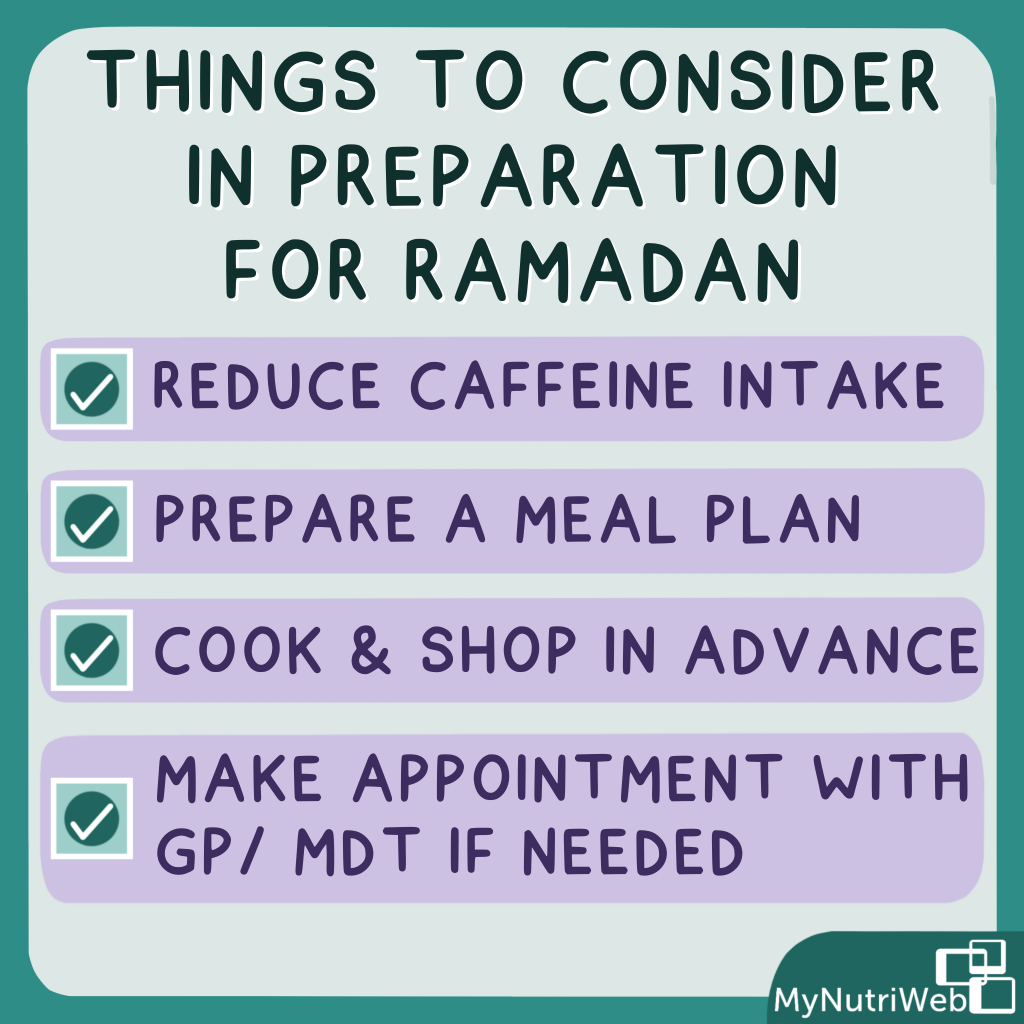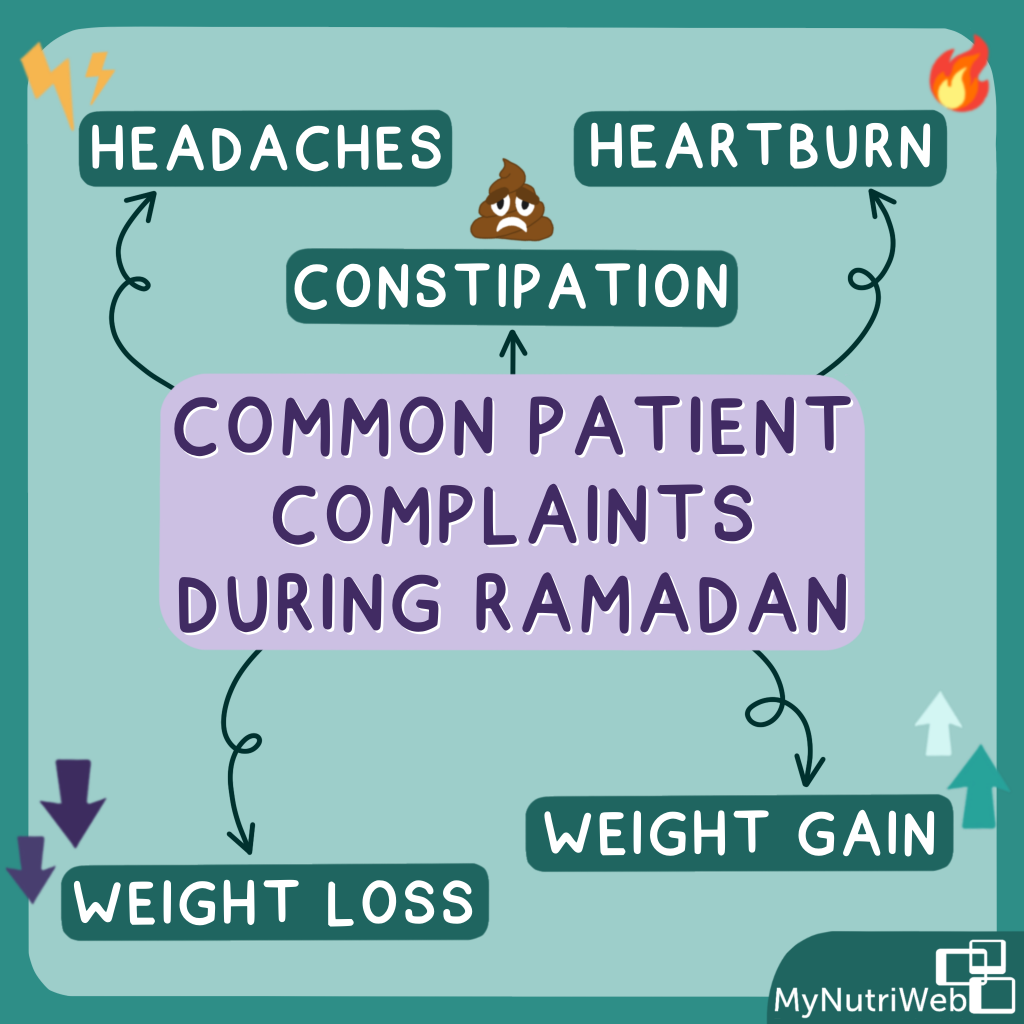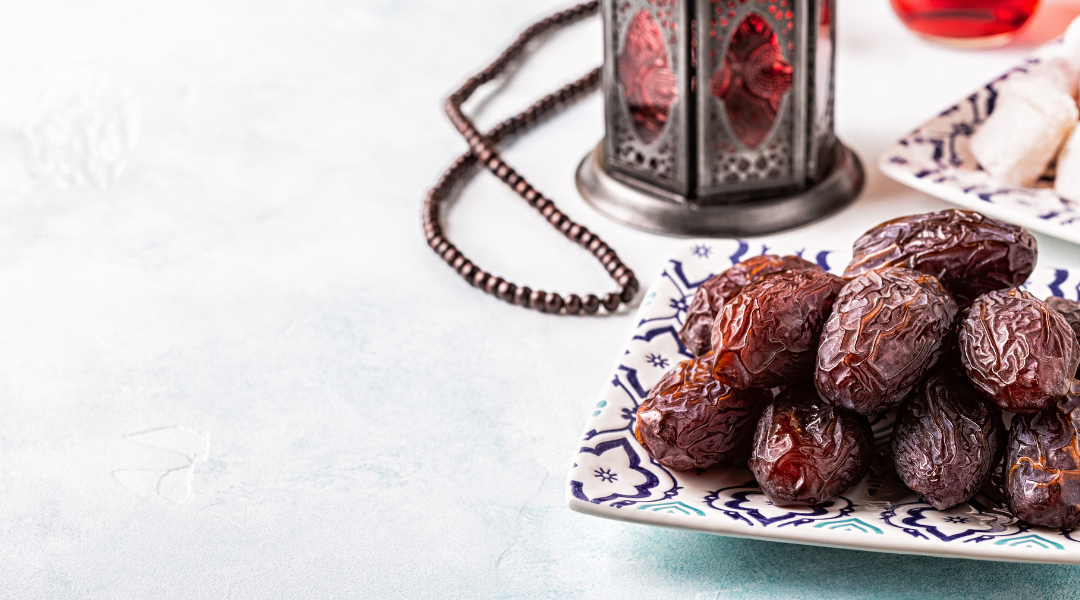 Guest author: Shehnaz Bashir RD, gutsynutrition.co.uk. Instagram: @Gutsy_Dietitian, Twitter: @Gutsy_Dietitian. Shehnaz is an NHS Community Dietitian and Freelance Dietitian with a specialist interest in gut health, living with a stoma and cultural diets. In this blog she explains the nutritional considerations of the Muslim holy month of Ramadan, which involves fasting during daylight hours, and how to help overcome common health complaints.
Guest author: Shehnaz Bashir RD, gutsynutrition.co.uk. Instagram: @Gutsy_Dietitian, Twitter: @Gutsy_Dietitian. Shehnaz is an NHS Community Dietitian and Freelance Dietitian with a specialist interest in gut health, living with a stoma and cultural diets. In this blog she explains the nutritional considerations of the Muslim holy month of Ramadan, which involves fasting during daylight hours, and how to help overcome common health complaints.
Ramadan is the 9th month in the Islamic calendar. It begins the morning after the moon crescent can be sighted as it is a lunar calendar, based on the cycles of the moon. In 2024, Ramadan is due to start on the 10th March 2024. The month signifies the first revelations of the Quran to the prophet Mohammed (peace be upon him). Those who are able to are required to fast from sunrise to sunset, give charity and increase prayer this month.
Fasting is one of the pillars of Islam. This involves abstaining from food, drink, sexual activity and smoking during daylight hours. Although Muslims are recommended to fast regularly throughout the year (for example, every Monday and Thursday), the compulsory fasts are in the month of Ramadan. As the length of fasts are dependent on hours of daylight, this will vary for Muslims around the world. In the UK, there will be small change during the course of the month, gradually increasing as the days get longer.
Certain groups of people are exempt from fasting: Women who are pregnant or breastfeeding, those who are travelling, illness (physical or mental) and old age. In these cases, the fast can be made up at a later date if able or a donation called Fidya can be paid to feed someone else1. Menstruating women are prohibited from fasting but are required to make up the fasts at a later date. Children are not expected to fast but may choose do “mini fasts” to feel part of the month.
Those who are exempt or do not observe the fasts of Ramadan may still have changes to lifestyle during this month. Increase in prayer, changes to types of foods, and timings of meals to eat with members of the household observing the fast. It is important to determine the level of observance by each individual as this will vary.
Preparation for Ramadan

- Reducing caffeine intake
To prevent symptoms of caffeine withdrawal, gradually switch one caffeinated drink a day to decaffeinated, herbal tea or water. Try using small cups instead of mugs to reduce portion sizes.
- Meal plan
As temptations for foods occur during a fast, preparing a weekly meal plan can help prevent over eating and food waste.
- Cooking and shopping in advance
Use the above meal plan to shop in advance and prevent unnecessary trips to the supermarket. Batch-freeze cooking prior to Ramadan can also help manage energy levels during the month. Include foods which have a longer shelf life and frozen/canned foods including fruits and vegetables.
- Appointment with GP/MDT for people with chronic conditions who wish to fast.
People with chronic conditions who wish to fast may require adaptations to care plans to increase compliance of health goals whilst fulfilling spiritual needs. A fast will become void if anything enters the throat, stomach or intestine1. Therefore, Individuals are likely to require input from healthcare professionals or multidisciplinary teams prior to this month. This includes:
– adjusting feeding and medication regimes for those who administer this via an enteral tube1.
– adjusting medications for conditions like diabetes to account for changes to diet and lifestyle2.
With limited medical research on Ramadan, the British Islamic Medical Association carried out a rapid review of the evidence of fasting with different chronic conditions3. Although recommendations are made, the decision to fast ultimately is with the individual.
A typical day in Ramadan
Before the fast begins, the Pre-dawn meal called Suhoor is consumed. The timing of this meal can vary, local mosques will provide timetables of meals and prayer times prior to the month. This will be around 3am in the UK in 2021. This meal is highly recommended and usually involves a source of protein, starchy carbohydrate and fluids. Cereals such as porridge, muesli, oats are good options with slow releasing energy, keeping you fuller and energised for longer – making them perfect for Suhoor. This is followed by the dawn prayer, Fajr.
Normal day-to-day routine. Many people will continue their normal activities whilst trying to increase daytime prayers. Planning for some rest throughout the day can help to ensure waking up for Suhoor is possible. For those who are working, adjusting hours to allow for rest may be helpful. Workplaces may also have specific policies around religion to help navigate these conversations prior to the month.
The fast ends at dusk, around 8pm. This meal is called Iftar and consists of an odd number of dates, water or milk, fruit and a full main meal. The types of foods consumed during Ramadan may be different to other months, Muslims from different cultures each have their own traditional foods for this month. The aim is to make meals balanced to meet nutritional needs and refuel the body prior to the next fast. Iftar is followed by the sunset prayer, Magrib.
Additional prayers called Tarawih which are exclusive to the month of Ramadan and observed by many Muslims either at home or in congregation (if COVID-19 restrictions allow). It can take up to 2 hours, depending on level of observance, adding to the changes in lifestyle during this month.
Common complaints and solutions

| Headaches |
|
| Heartburn
|
|
| Constipation |
|
| Weight gain
|
|
| Weight loss
|
|
Supplements
A supplement of 10 micrograms of Vitamin D per day as per Public Health England recommendation continues to be relevant throughout the month of Ramadan. Other vitamin and mineral requirements can be met with a well balanced diet between fasts. If this is not possible, individuals may require over the counter Multivitamins.
Eid
The month of Ramadan (either 29 or 30 days) ends with the sighting of the new moon. The three day celebration called Eid al-Fitr then takes place. Fasting is prohibited during this celebration and it is marked with food, charity, gifts, community and family events.
I hope every observing this month has a wonderful Ramadan.
Ramadan Mubarak!
References
- Ramadan Health Factsheet 2021 (2021) Muslim council of Britain
- Ramadan and diabetes (2021) Diabetes UK
- Ramadan Rapid Review (2020) British Islamic medical Association
LAST UPDATED: 22 March 2023







I really enjoyed your blog. It clarified what is required during Ramadan.
Just 2 comments- I think full fat milk should be the norm. I would think Ramadan is hard enough without having to change to low fat milk. Low fat milk contains less vitamins so people may need more supplements of vitamin D.
I would not be in favour of restricting cheese. Restricting Halloumi and Feta is difficult for Vegetarians also 65 + year old senior citizens need more protein than younger adults.
Other than that I thought it was an excellent clear article, well written and researched and most informative. I wish you all the best during Ramadan. Happy Eid al-Fitr.
WOW! its Great Information should share it with my family and friends
https://www.muslimsholytravel.co.uk/ramadan-umrah-packages/